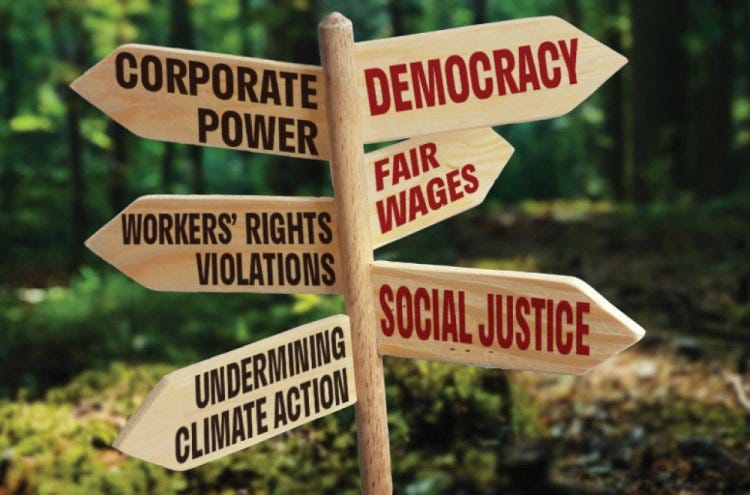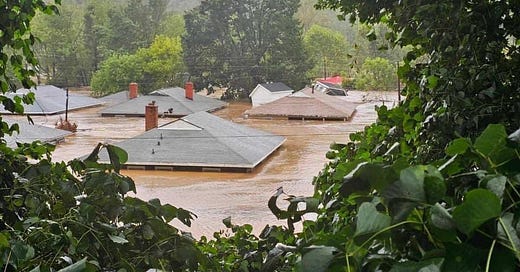The news, as far as deadly hurricanes, flooding, and wildfires are concerned, is pretty dire at the moment. Hurricane Helene, a Category 4 storm when it made landfall in Florida on 9/26, has killed more than 50 people as of today (9/29), left about 4 million without power, caused massive flooding and landslides because of torrential, record-breaking rains and flash floods.
In Nepal, at least 66 people are dead and many more are missing after continuous rainfall triggered flooding and landslides, as of 9/28.
Hurricane John leaves at least 22 dead, caused by mudslides and floods, and returns to Mexico for the second time as a storm, 9/28.
India’s monsoon season caused record-high waters this year, submerging villages and killing many. Normally, the monsoon is over by the end of September, but shows no sign of letting up this year.
Maybe you read about the devastating floods in Europe, a bit earlier this month. Austria and northern Italy were badly hit by storm Boris which had already killed at least 21 people in central and eastern Europe. And England has already gotten four times the average rainfall this month, with more predicted and 58 flood warnings across the country (9/28).
And let’s not forget Japan: “unprecedented” rainfall in Ishikawa Prefecture, located on the Sea of Japan coast, caused floods and landslides, damaging many of the temporary housing structures which had been built after a 7.5 magnitude earthquake destroyed tens of thousands of homes on January 1, 2024.
On the other end of the spectrum, hellish fires in Brazil are destroying the Amazon RainForest, caused by “extreme drought affecting nearly 60% of the country, the climate crisis and a seemingly insatiable appetite to destroy the environment for immense financial gain”. Forests and farms have been ablaze for weeks.

In Portugal, in mid-September at least 128 separate and labeled as devastating wildfires were burning nationwide, killing at least nine and leaving more than 50 injured. While firefighters managed to control the blazes by September 21, some personnel remain on the ground to monitor the affected areas.
Personally, I find it sad that none of the many newspaper articles which reported about the disasters above ever mentioned the many wild and domestic animals that must have perished. Not one. As if they wouldn’t matter at all. That tells you something, doesn’t it. When I googled “Hurricane Helene” and “animals”, I found one mention of 56 animals that were rescued by the National Guard.
However, almost every article listed climate change as a major cause for increasingly extreme and dangerous weather events. I guess that’s an improvement, when there’s still people who claim that it is a hoax.
And then there was yet another worrisome newsitem: a press release from the Potsdam Institute for Climate Impact Research (PIK), an organization with over 250 international scientists who are part of a global network of scientific and academic institutions working on questions of global environmental change. One of its two directors is the Swedish scientist Johan Rockström who first came up with the Planetary Boundaries framework. It considers the Earth like an ailing patient, and identifies nine “planetary life support systems” with thresholds – boundaries – which should not be crossed if we want to prevent catastrophic change.
Actually, six have been crossed already. The image above identifies the nine Planetary Boundaries (PBs), and the color around the symbol indicates the level of risk: four have a red circle, indicating high-risk zones, three are green: within a safe operating space, and two are yellow, meaning a zone of increasing risk.
Going clockwise from the top, the PBs are:
Climate Change (red)
Introduction of Novel Entities such as synthetic chemicals and GMOs (red)
Stratospheric Ozone Depletion (green)
Increase in Atmospheric Aerosol Loading (green)
Ocean Acidification (green – increasing acidity caused by absorption of atmospheric CO2 )
Modification of Biogeochemical Flows (red – too much nitrogen and phosphorus in soil and water)
Freshwater Change (yellow)
Land System Change (yellow – deforestation and urbanization)
Change in Biosphere Integrity (red – decline in diversity, extent, and health of living organisms and ecosystems)
PIC’s press release from September 24 issues the dire warning that the seventh Planetary Boundary is close to an imminent breach: Ocean Acidification. Increasing carbon dioxide emissions lower the oceans’ pH levels, which is deadly for coral reefs, especially for the Great Barrier Reef which started growing 20,000 years ago and is the world’s biggest single structure made by living organisms. Mussels and oysters are threatened as well; their shells are made from calcium carbonate and get damaged in low pH levels.
I encourage you to watch the documentary Breaking Boundaries: The Science of Our Planet, made by Sir David Attenborogh and Johan Rockström in 2021. It’s streaming on Netflix, see the trailer above.
Of course, the big question is: what can one do about this, if it’s not too late anyway? You may feel helpless as an individual, it may look absolutely impossible to stem the impact of global corporations who only care about profits and have the power to influence politics. But I’m convinced that a person’s sincere intention to be good – to do as little harm as possible – is powerful as well. I’m convinced that being vegan is helpful. I’m convinced that any serious attempt to lower one’s carbon footprint is good for the environment and the Earth.
Maybe you’re already a vegan, and you think I’m preaching to the choir. Well, you could always try something else – aim for zero trash. Or try to avoid plastic packaging as much as possible – not so easy! Again, I think it’s the intention that counts.
And if you’re still eating meat and/or cheese and dairy, I don’t want to give you a hard time, but I encourage you to be honest with yourself. In view of the horrendous destruction animal agriculture inflicts on the planet – why do you? Maybe it tastes too good to give up. Being honest is a good first step.

Voting is crucial as well. A recent article in the Guardian reported about Corporate Underminers of Democracy, the International Trade Union Corporation’s list of
“emblematic companies that benefit financially by continuing to violate trade union and human rights, monopolise media and technology, exacerbate climate catastrophe, and privatise public services… They are invariably led by ultra-wealthy individuals that support and finance far-right politicians and parties to further their own interests.”
Number One on the list is Amazon.com. I order stuff from Amazon.com because it’s so convenient, but I’ll have to seriously reconsider… and, of course, vote FOR democracy.







